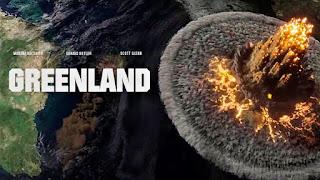
The sudden appearance of a new comet, which is projected to pass as close to earth as any celestial body in recorded history, kicks off a chain of cataclysmic events in director Ric Roman Waugh’s Greenland, a 2020 movie that proves to be more of a human drama than an apocalyptic disaster film.
The whole world is watching as the newly-discovered Clarke comet flies past earth, so close that it will be visible in the daytime sky.
Our first indication that there’s more to this comet than a colorful display comes when Atlanta-based engineer John Garrity (Gerald Butler) receives a mysterious voice message from the United States Department of Homeland Security, informing him that he, his estranged wife Allison (Morena Baccarin), and their young son Nathan (Roger Dale Floyd) have been selected for emergency sheltering, and must report to a nearby Air Force base by 9:45 pm. John ignores this message, only to realize its significance when a piece of the Clarke comet slams into Florida, destroying most of the state.
As news reports come across that fragments of Clarke will continue to pound the globe - including debris so large it could cause an extinction-level event - John and family drive to their designated rendezvous point, only to be turned away when it’s discovered that Nathan suffers from diabetes (the military has been instructed to reject anyone with an illness).
Separated from his family in the ensuing chaos (the base is stormed by thousands of panic-stricken citizens), John must travel to the home of Allison’s father (John Glenn) to reunite with her and Nathan, all the while thinking of a way to get his family to Canada, where a plane will carry any survivors who make it that far to a military bunker in Greenland mere hours before the comet is scheduled to hit.
The Clarke comet and the devastation it causes (ranging from small bits of debris that crash to earth to the destruction of entire cities) is merely the backdrop for Greenland; this is the story of a man who has made mistakes in the past (we eventually discover John’s infidelity led to his current marital woes with Allison), yet is determined to do whatever he must to get his family to safety. Along the way, John and Alison meet up with all sorts of people, from those ready to help (John learns about the Canadian plane from Colin, played by Andrew Byron Bachelor, who was traveling there himself and invites John to join him) to the desperate few out to save their own skins (when they first arrived at the Air Force base, John, Allison, and Nathan were issued wristbands by the military, identifying them as chosen survivors. After they are turned away, these wristbands make them prime targets for anyone desperate enough to steal them and try their luck at another base).
The cast is strong, with Butler and Baccarin doing a fine job as the motivated couple fighting the clock to make their way to safety. Yet it was young Roger Dale Floyd as Nathan who impressed me the most, giving a performance every bit as good as the film’s more experienced actors. And while the focus of Greenland is placed squarely on its characters, there are some decent action sequences as well (especially impressive is the scene in which a shower of molten debris hits a highway in upstate New York).
Alas, the key ingredient that is lacking in Greenland is suspense; there was never a moment when I felt John Garrity and his family wouldn’t survive, and do so together, regardless of the circumstances (there’s even a brief section of the film where all three are separated from each other).
On a technical level, Greenland is a well-made film, with a good cast, effects that work as intended, and a story of global devastation that is never dull. But it is also far more predictable than a movie of this nature should be.
Rating: 6.5 out of 10
